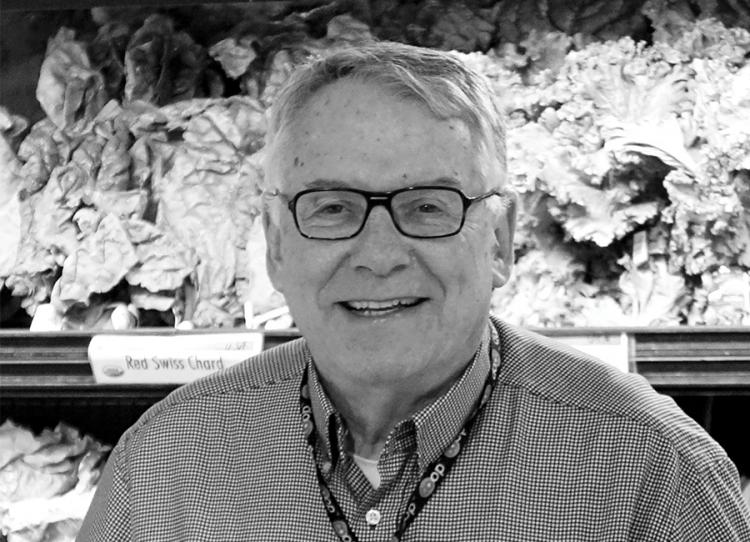Hanover Co-op GM Retires

Hanover, N.H.—Terry Appleby works in a bright, capacious office on a wooded hillside a few miles southeast of Dartmouth College. One day this past summer, I met him there for lunch.
“I haven’t been to your office in a while,” I said. He smiled and patted my shoulder. “It won’t be my office for long.”
Appleby, a quiet, contemplative leader who has dedicated his life to cooperatives, will retire from the Hanover Co-op at the end of this year. His length of service and contributions to the greater cooperative movement are considerable. His career spans two coasts, two co-ops, and four decades.
“In the world of cooperation, he is a gentle giant who radiates what is best about cooperation as a way of organizing society,” said Appleby’s colleague and mentor, Tom Webb, who runs the graduate program in cooperatives and credit unions at St Mary’s University in Halifax, Nova Scotia.
The Hanover Co-op is a storied, 80-year-old cooperative with locations in Vermont and New Hampshire. For nearly 25 years, Appleby, an easygoing man with a boyish face and dark-rimmed glasses, has served as its general manager. For nearly 40 years, he has served co-ops en masse, dreaming of a utopian network of self-sustaining cooperative communities.
“Terry has provided critical leadership in not just the food co-op sector but in other co-op sectors,” said David Thompson, a co-op activist and author. “In all the settings I know, Terry’s talents were always employed in pursuit of building a stronger cooperative economy.”
Appleby is the oldest of nine children from a New Jersey working-class family. He earned a bachelor’s degree in political science from St. Joseph’s University in Philadelphia and a master’s degree in Latin American studies from Louisiana State University in
Baton Rouge.
In 1980, Appleby was living in Seattle while his wife, Mary, attended graduate school. He took a job as a store clerk at Puget Consumers Co-op (PCC), a plucky Seattle co-op. Appleby liked that PCC was democratically managed. Its radical thinkers wanted to run the business in an egalitarian way. “We’d read books and talk about management and democracy,” Appleby said. “But at the same time we were doing it every day. It wasn’t just theory. We were living it.”
PCC transitioned to a traditional structure, with a board, management team, and general manager. Over 12 years, Appleby worked his way up to management team, but when he applied for the job of general manager, he didn’t get it.
On a spring day in 1992, Appleby applied for a general manager position at the Hanover Co-op, and he interviewed that August. “I bought this heavy, funky, 1950s suit from Goodwill,” Appleby said. “Then I came out to New England in the 90-degree weather.” Appleby was hired and started work in October.
At that time, the Hanover Co-op was a one-store business doing $15 million in sales. Today, it comprises three food stores, a market, a service center, a culinary learning center, a commissary kitchen, and a suite of administrative offices. It employs close to 400 people. This year, it’s on track to do $70 million in sales and $14 million in local-food sales. It has nearly 300 local suppliers.
“For some of us,” said Pooh Sprague, a New Hampshire farmer, “if it wasn’t for the Hanover Co-op, we might have folded years ago.”
Appleby was mentored by Webb, Andy Ferguson, and the late Sid Pobihushchy—visionary co-op thinkers who wanted to change society. Appleby’s goal became twofold: build a successful business, and lay the foundations for a national cooperative economy.
“Sid once said cooperation was the ideal state of society,” Appleby said. “He really believed it and infected other people with this idea that community good and individual good are linked.”
Appleby helped form National Co+op Grocers (NCG) and the Neighboring Food Co-op Association (NFCA). He was an early champion for fair trade, sustainability, and the local food movements. He also won several major cooperative awards.
Things haven’t always been rosy. More than once, Appleby’s mettle was tested by grueling, contentious periods he thought would never end. Even then, he said, he put his faith in cooperation. “I really do believe in the cooperative model, in good times and bad,” he said. “With all the troubles in the world, cooperation is a great thing. And if we can grow the co-op model, that’s a great thing, too.”







